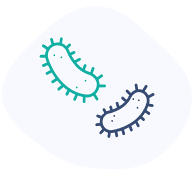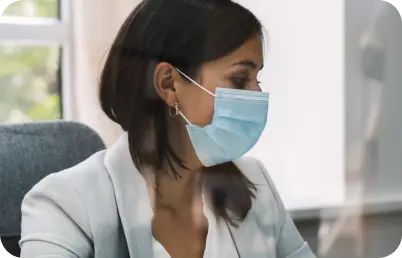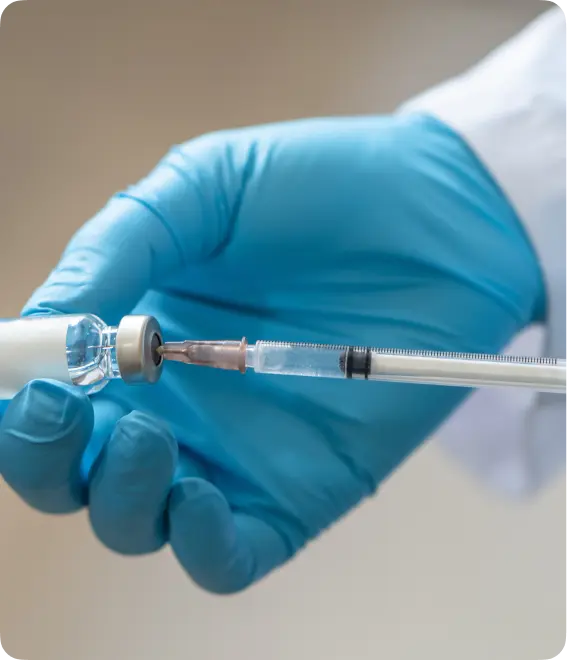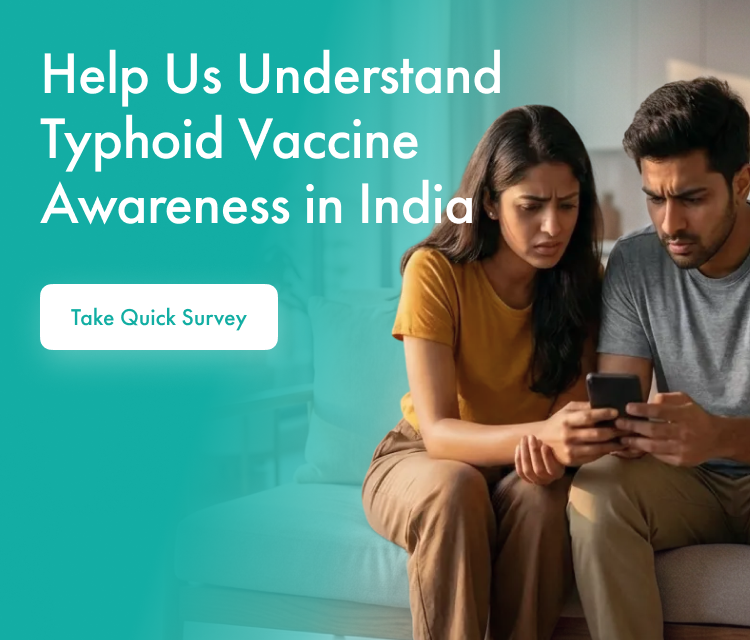Help Us Understand Typhoid Vaccine Awareness in India
















India has the highest number of typhoid cases in the world.*[1,2] Yet, how much do we really know about it?
If proactive prevention measures don’t take centre stage, you could be at risk, too.

4-5 million cases of typhoid are reported globally every year[3]

Typhoid symptoms usually develop 1 or 2 weeks after a person becomes infected[4]

Without proper treatment, typhoid could be fatal in up to 30% of cases[5]
*According to the data collected between 2017 and 2020, India bears over half of the global typhoid burden. Current data may vary.
Sources: John et al., NEJM 2023; Cao et al., JID 2021.
Why is typhoid a serious health concern?

Antimicrobial resistance
Widespread (rampant and irrational) antibiotic use has fueled antibiotic resistance (AMR), leading to more drug-resistant typhoid bacteria, resulting in increased complications and making treatment difficult with common drugs used to treat typhoid.[6]

Systemic infection
Typhoid spreads from the intestines through the blood to organs, impacting several organs. Untreated, it would trigger severe symptoms and complications, causing great suffering, widespread damage and potentially fatal outcomes.[7]

Contagious
Typhoid is transmitted via contaminated food and water that fuels outbreaks, especially in areas with unsafe water or food, poor standards of personal hygiene and poor sanitation, posing a significant public health threat.[8]

Carrier state
Even after recovery, individuals can unknowingly harbour typhoid bacteria in their intestines, which can then spread, creating a persistent risk of new infections and hindering effective disease control.[8]
Typhoid prevention is within reach!
Here are a few simple steps to defend against typhoid
Vaccination

Get vaccinated
WASH Technique (Water)

Consume clean drinking water
WASH Technique (Sanitation)

Practice safe sanitation
WASH Technique (Hand Hygiene)

Maintain hand hygiene and sanitation
Want to know how to keep you and your family safe from typhoid?
Find Vaccination Centres Near Me

#MonsoonTips
Rain & Remedies: Monsoon Health Reads
Essential health blogs for the rainy season

A deeper look:
Typhoid insights for healthcare professionals
Stay informed with the latest research, epidemiological data, clinical guidelines and evidence-based strategies to improve diagnosis, treatment and prevention of typhoid.
Frequently asked questions
What is typhoid?
Typhoid fever is caused by the bacteria Salmonella typhi, and it spreads through contaminated food and water. Infected patients show symptoms of a gradually increasing fever along with headache, stomach ache and weakness.[6]
What are the common symptoms of typhoid fever?
The most common symptoms of typhoid are a persistent fever with a temperature increasing every day, headache, extreme fatigue, stomach pain and constipation or diarrhoea.[9]
Can typhoid fever cause long-term health problems?
If left untreated, typhoid fever can cause serious health complications, including intestinal bleeding or perforation. In severe cases, it can also affect other organs, including the brain.[10,7]
Can typhoid spread through casual contact with an infected person?
No, typhoid fever doesn’t spread through direct or casual contact with an infected person. But, if you come into contact with something they have touched, especially if they haven’t washed their hands after going to the washroom, you may be at risk of contracting typhoid.[11]
How long does it take to recover from typhoid?
Once you start treatment for typhoid, you will start feeling better in a few days. It can take up to 10 days to feel completely recovered from the fever, and it might take even longer for the fatigue and weakness to subside. However, if you have complications or relapse, then recovery can take longer.[10]
What are the different types of typhoid vaccines available?
There are two types of vaccines available for typhoid fever:
- Typhoid Conjugate Vaccine (TCV)
- Vi Polysaccharide (Vi-PS)[11]
Resources
- https://www.nejm.org/doi/pdf/10.1056/NEJMoa2209449
- https://pubmed.ncbi.nlm.nih.gov/35238365/
- https://immunizationdata.who.int/global/wiise-detail-page/typhoid-reported-cases-and-incidence?CODE=Global&YEAR=
- https://www.nhs.uk/conditions/typhoid-fever/symptoms/
- https://acvip.org/parents/columns/typhoid.php
- https://www.ncbi.nlm.nih.gov/books/NBK557513/
- https://www.mayoclinic.org/diseases-conditions/typhoid-fever/symptoms-causes/syc-20378661
- https://pmc.ncbi.nlm.nih.gov/articles/PMC10236512/
- https://www.nhs.uk/conditions/typhoid-fever/symptoms/
- https://my.clevelandclinic.org/health/diseases/17730-typhoid-fever
- Purple Book: IAP Guidebook on Immunization 2022 By Advisory Committee on Vaccines and Immunization Practices (ACVIP)
- https://www.nhs.uk/conditions/typhoid-fever/causes/
- https://www.cdc.gov/typhoid-fever/prevention/index.html
- https://www.cdc.gov/clean-hands/data-research/facts-stats/
- https://www.who.int/news-room/fact-sheets/detail/typhoid
Disclaimer: A public awareness initiative by Bharat Biotech International Limited. This information is for general awareness only and does not constitute medical advice. The doctors, medical facilities and graphics shown are for illustrative purposes only. For any medical advice or any question or concern you may have regarding your condition, consult your doctor.



